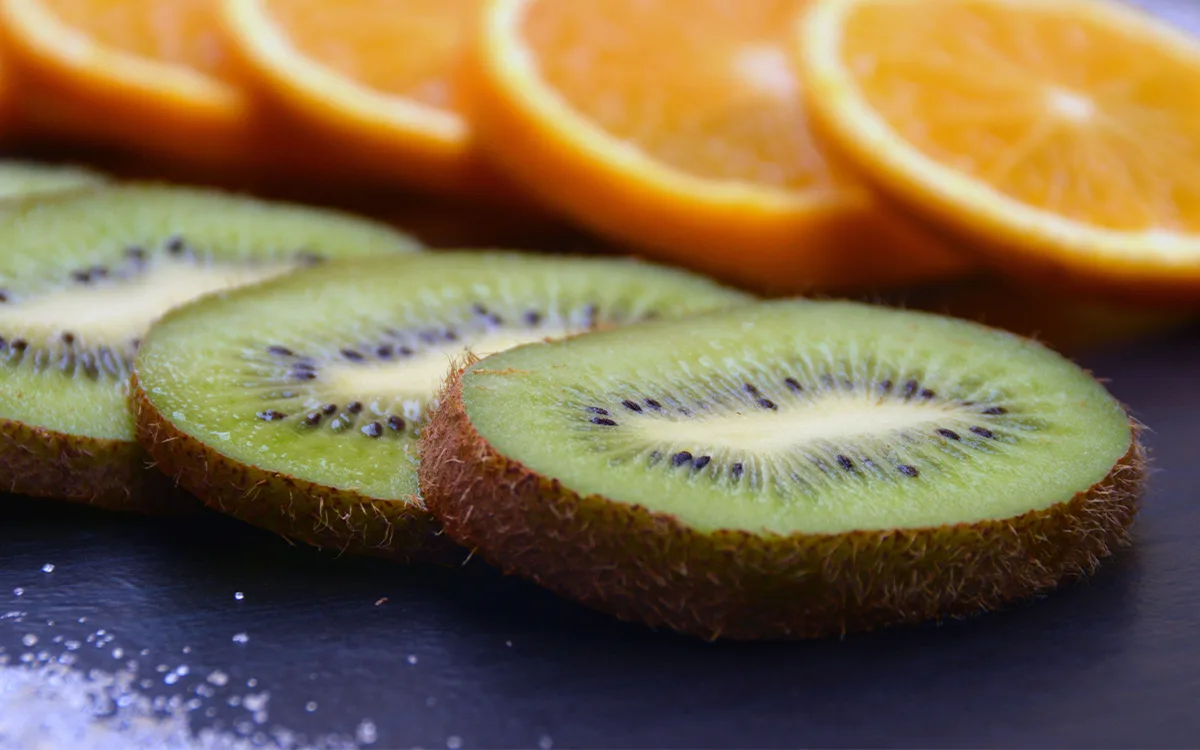When we think of fruits that are rich in vitamin C, oranges are often the first that come to mind. But here is something many people do not know—kiwi fruit, especially the green kiwifruit, actually carries more vitamin C than oranges. Apart from its tangy-sweet taste, kiwi is packed with nutrients that make it one of the most valuable fruits you can add to your daily meals. From helping your body handle oxidative stress to supporting digestion, kiwi nutrition offers many surprising health benefits.
In this blog, let us look at kiwi nutrition in detail and understand 11 surprising benefits of kiwi fruit, along with why it deserves a place on your plate.
What makes kiwi nutrition special?
Kiwi fruit is small, but it carries a powerful set of nutrients. It is naturally high in vitamin C, even more than many citrus fruits, making it a great option for daily vitamin intake. It is also rich in vitamin K, vitamin E, fiber, potassium, and antioxidants.
This mix of nutrients helps your body handle oxidative stress caused by free radicals. Eating kiwi regularly can help maintain balance in your system, support your immune system, and aid natural energy levels.
How does kiwi have more vitamin C than oranges?
A medium-sized green kiwifruit contains about 70 milligrams of vitamin C, while an average orange carries slightly less. That means kiwi can be one of the best good sources of vitamin C among fruits and vegetables.
Vitamin C is a vital nutrient that plays a role in supporting your immune system, helping the body absorb iron from plant foods, and helping ease tiredness. Since kiwi has a high vitamin C content, eating just one or two a day can help you meet your daily requirement naturally.
What are the 11 surprising benefits of kiwi fruit?
Here are 11 reasons why kiwi deserves to be called a nutrient powerhouse:
- Rich in vitamin C – More vitamin C than oranges, helping support natural defense.
- High in antioxidants – Helps the body handle free radical damage and oxidative stress.
- Aids protein digestion – Contains a natural enzyme called actinidin that helps break down protein-rich foods.
- Good source of fiber – Helps maintain digestive comfort and ease occasional discomfort.
- Supports iron absorption – The high vitamin C content makes it easier for your body to absorb iron from plant-based meals.
- Natural hydration – Kiwi is packed with water, making it a refreshing fruit for hydration.
- Rich in vitamin K and vitamin E – Contributes to daily nutrient balance and helps maintain body functions.
- Supports skin health – Antioxidants and vitamin C in kiwi can help maintain skin texture and natural glow.
- Helps maintain energy levels – Nutrients in kiwi help ease tiredness and support daily activity.
- Low in calories, nutrient dense – A great choice if you want to enjoy fruits without worrying about extra calories.
- Great for variety in diet – Kiwi adds color, flavor, and nutrients to fruit bowls, salads, and smoothies.
How does kiwi help with oxidative stress?
Modern lifestyles expose our bodies to stress, pollution, and processed foods. These factors can impact the activity of free radicals, which may disturb natural balance inside the body. Kiwi is rich in vitamin C and other antioxidants, which play a role in handling this challenge.
By eating kiwi regularly, you are giving your body nutrients that help maintain this balance. Over time, this can help ease discomforts linked to oxidative damage and support overall wellness.
How can you add kiwi to your diet?
The good news is that kiwi is a very versatile fruit. You can eat it raw, add it to a fruit salad, or blend it into smoothies. It pairs well with other fruits and vegetables, making it a colorful addition to any plate.
- Morning snack: Eat one or two kiwis as a quick, refreshing bite.
- Smoothie mix: Blend kiwi with spinach, banana, or berries for a nutrient-rich drink.
- Salad topper: Add sliced kiwi to green salads for a mix of sweet and tangy flavor.
- Dessert option: Use kiwi slices in yogurt bowls or as a topping for oatmeal.
Including kiwi as part of your daily fruit and vegetables intake can be a simple way to enjoy its full set of health benefits.
Conclusion
Kiwi fruit may look small, but its nutrition is nothing short of powerful. With more vitamin C than oranges, high antioxidant content, and unique benefits like aiding protein digestion, kiwi easily stands out as one of the most valuable fruits for daily health.
By adding kiwi to your meals, you are not just enjoying a tangy-sweet treat—you are also giving your body the support it needs to handle oxidative stress, maintain energy, and stay nourished.
Check out this blog: What Does Taurine Do for Your Body?

